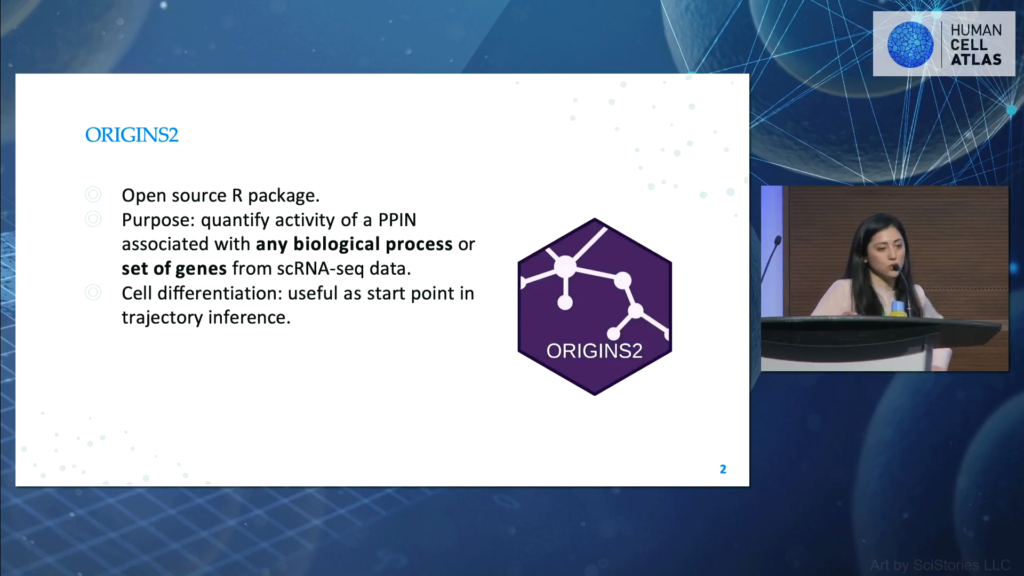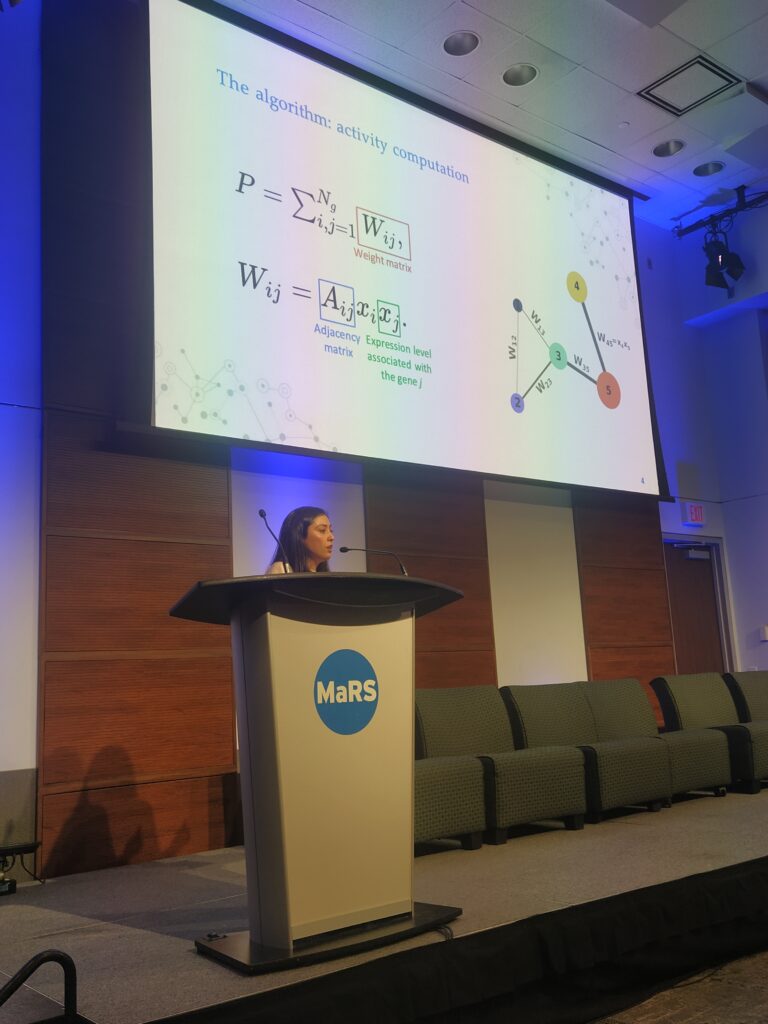The Open Bioinformatics Foundation (OBF) Event Fellowship program aims to promote diverse participation at events promoting open-source bioinformatics software development and open science practices in the biological research community. Daniela Senra, a PhD researcher at Centro Regional de Estudios Genómicos, Universidad Nacional de La Plata, was awarded an OBF Event Fellowship to attend the Human Cell Atlas General Meeting 2023.
In July, I had the incredible opportunity to attend and present a lightning talk at the Human Cell Atlas General Meeting 2023, that took place in the city of Toronto, Canada, from July 10th to July 12th, 2023.
 Photo of Daniela giving her talk and sharing about the open-source tool ORIGINS2.
Photo of Daniela giving her talk and sharing about the open-source tool ORIGINS2.
Discovering New Insights at the Meeting
The three-day event was packed with activities, including keynote speeches, breakout sessions, lightning talks, and poster sessions covering various topics.
On the first day, I was particularly captivated by talks that resonated with my research interests. Notably, the presentation on ‘What makes a stem cell a stem cell and how does it go bad’ held great relevance to my PhD thesis, focusing on stem cells and cancer stem cells. Additionally, a breakout session on ‘Increasing accessibility/building great scientific communities’ struck a chord with me as someone from Argentina—a developing country—where access to public data and open-source pipelines is crucial for contributing to the scientific community. Later, I had the privilege of sharing my own research in a talk titled ‘Stem cell determination from scRNA-seq data using a protein network-based approach.’ My work, an open-source R package developed in collaboration with my advisors Luis Diambra and Nara Guisoni, originally aimed to quantify pluripotency from scRNA-seq data but evolved into a computational technique to quantify any biological process using protein-protein interaction networks. The application that motivated this work was the identification of stem cells, serving as a starting point for performing trajectory inference. For those interested in our work, the publications can be accessed using the links: https://www.sciencedirect.com/science/article/pii/S2215016123001796 and https://www.sciencedirect.com/science/article/pii/S2215016122001583.
The second day’s focus on machine learning was especially appealing to me, given my frequent use of unsupervised learning techniques in my research. I also found the section on spatial methods intriguing, considering their potential relevance to my future work. The third and final day concentrated on biological function, directly related to my presentation, making it an interesting topic.
Open source as a central topic
In my lightning talk, I was able to promote my open source project, as many participants also highlighted. Throughout the conference, the importance of open source became a transversal theme. Undoubtedly, open source plays a pivotal role in science, accessibility and transparency allows scientists to freely access, modify and distribute software tools and solutions. This democratization of knowledge not only enhances the quality of research but also enables scientists from developing countries to actively participate in shaping the future of science and technology.
Empowering Personal and Professional Development
Having attended virtual HCA events during the pandemic, the opportunity to participate in person at the General Meeting was unique for me. It was my first time participating in an international event, and I was very excited. Yet, two months before the event, I was unsure if I could afford to attend, as the travel costs seemed impossible. Securing funding for such activities can be a daunting challenge for scientists in developing countries. However, my hopes were restored when I received an email from the Open Bioinformatics Foundation informing me that I had been awarded the OBF Event Fellowship. This news enabled my participation, which was especially meaningful as I am on the brink of completing my PhD and exploring new opportunities for my future endeavors.
The experience was undeniably one of the highlights of my ongoing PhD journey. I had the privilege of connecting with fellow researchers who shared similar interests—an opportunity that is limited in Argentina, given the still-developing nature of this area of research. The networking opportunities were invaluable, allowing me to build strong connections with professionals worldwide. Moreover, I believe that being part of this event contributed to promoting diversity, as Latin America is often underrepresented in international scientific gatherings. To my surprise, some participants approached me to express that I was the first person from Argentina they had met working with scRNA-seq data. This realization filled me with pride and a sense of responsibility, as I hope to see more Latin American scientists, especially women, gain more opportunities and equitable representation in the global scientific community.
A Heartfelt Thanks to the OBF
None of this would have been possible without the support of the Open Bioinformatics Foundation. I am immensely grateful to the OBF for their generous support, which made my participation in this exceptional event a reality.

In conclusion, the Human Cell Atlas General Meeting 2023 was an unforgettable experience that broadened my professional and personal horizons. I left the event with new knowledge, invaluable connections, and a renewed determination to contribute to the scientific community.